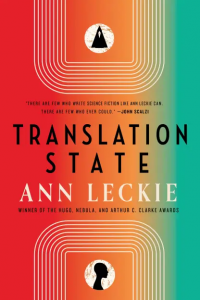Gary K. Wolfe reviews The Long Game by K.J. Parker
 The Long Game, K.J. Parker (Subterranean 978-1-64524-080-0, $44.88, 108pp, hc) March 2022.
The Long Game, K.J. Parker (Subterranean 978-1-64524-080-0, $44.88, 108pp, hc) March 2022.
K.J. Parker may not have invented the idea of using an exasperated, put-upon narrator to undercut the implicit pretensions of a classic fantasy setting, but he’s certainly become its reigning virtuoso. His latest novella, The Long Game, is again set in his alternate late-medieval Europe, with its not-quite-recognizable place names like Idalia or Sabades Amar but fully recognizable Latin phrases for spells and incantations. The unnamed narrator works as a kind of exorcist, capable of entering people’s minds to cast out demons that have taken residence, much as in Prosper’s Demon a couple of years ago. But both he and the demons he opposes are assigned specific territories and ‘‘are answerable to their area supervisors and regional, provincial, and divisional officers’’ – in other words, to annoying bureaucracies with distinctly contemporary corporate overtones. It’s not surprising that the narrator has developed an ongoing arrangement with a particular demon, the two of them occasionally looking out for each other in the service of outsmarting their own supervisors. Each also recognizes that, despite such alliances of convenience, each side is involved in the long game of winning souls.
The narrator is on one such backwater assignment when he meets a beautiful young woman named Amalasomtha, who claims to be on a mission of her own from Idalia, a country so remote that it’s the stuff of legend and rumor. She’s also clearly unimpressed by the narrator’s authority as a representative of the Studium – the hidebound center of learning which is a recurring feature of Parker’s version of Europe – and when he tries to enter her mind with a simple spell, she responds with a psychic bolt that knocks him off his feet. Since women in his world almost never have the knack to become adepts, and since Amalasomtha has traveled such a great distance on a mysterious mission, the narrator becomes intrigued, and they become uneasy allies. He (and we) learn more about Idalia, where demons are apparently unknown and where the mental powers carefully cultivated by the Studium are nothing special. When he learns what her actual mission is, however, he has some serious second thoughts.
As is often the case, the narrator’s various digressions and backstory anecdotes, along with the screwball banter with his demon pal (especially when they find themselves occupying the same hapless victim) are as spirited and entertaining as the main plot, and part of the continuing charm of this series is its ingratiatingly misanthropic tone. Like many of Parker’s narrators (most notably, perhaps, the Saloninus of last year’s The Big Score), this one veers between boasting of his talents and making excuses not only for his bad behavior, but for the fact that his vaunted skills have never really paid off in the way he believes he deserves. It’s no wonder a lot of fantasy readers find it easy to identify with these guys, as morally dubious and comically self-absorbed as they may be.
Gary K. Wolfe is Emeritus Professor of Humanities at Roosevelt University and a reviewer for Locus magazine since 1991. His reviews have been collected in Soundings (BSFA Award 2006; Hugo nominee), Bearings (Hugo nominee 2011), and Sightings (2011), and his Evaporating Genres: Essays on Fantastic Literature (Wesleyan) received the Locus Award in 2012. Earlier books include The Known and the Unknown: The Iconography of Science Fiction (Eaton Award, 1981), Harlan Ellison: The Edge of Forever (with Ellen Weil, 2002), and David Lindsay (1982). For the Library of America, he edited American Science Fiction: Nine Classic Novels of the 1950s in 2012, with a similar set for the 1960s forthcoming. He has received the Pilgrim Award from the Science Fiction Research Association, the Distinguished Scholarship Award from the International Association for the Fantastic in the Arts, and a Special World Fantasy Award for criticism. His 24-lecture series How Great Science Fiction Works appeared from The Great Courses in 2016. He has received six Hugo nominations, two for his reviews collections and four for The Coode Street Podcast, which he has co-hosted with Jonathan Strahan for more than 300 episodes. He lives in Chicago.
This review and more like it in the March 2022 issue of Locus.
 While you are here, please take a moment to support Locus with a one-time or recurring donation. We rely on reader donations to keep the magazine and site going, and would like to keep the site paywall free, but WE NEED YOUR FINANCIAL SUPPORT to continue quality coverage of the science fiction and fantasy field.
While you are here, please take a moment to support Locus with a one-time or recurring donation. We rely on reader donations to keep the magazine and site going, and would like to keep the site paywall free, but WE NEED YOUR FINANCIAL SUPPORT to continue quality coverage of the science fiction and fantasy field.
©Locus Magazine. Copyrighted material may not be republished without permission of LSFF.






